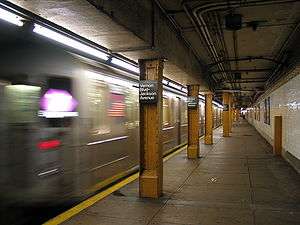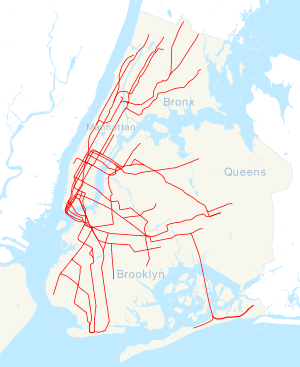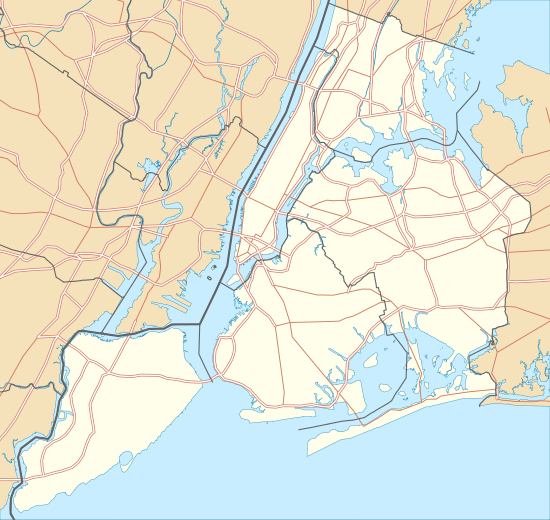Vernon Boulevard–Jackson Avenue (IRT Flushing Line)
Vernon Blvd–Jackson Avenue | |||||||||
|---|---|---|---|---|---|---|---|---|---|
|
| |||||||||
 A <7> Express train speeds out of Vernon Boulevard–Jackson Avenue station. | |||||||||
| Station statistics | |||||||||
| Address |
50th Avenue between Vernon Boulevard & Jackson Avenue Queens, NY 11101 | ||||||||
| Borough | Queens | ||||||||
| Locale | Long Island City | ||||||||
| Coordinates | 40°44′34″N 73°57′14″W / 40.74264°N 73.95391°WCoordinates: 40°44′34″N 73°57′14″W / 40.74264°N 73.95391°W | ||||||||
| Division | A (IRT) | ||||||||
| Line | IRT Flushing Line | ||||||||
| Services |
7 | ||||||||
| Transit connections |
⛴ NYC Ferry: East River, Lower East Side, and Astoria routes (at Center Boulevard and Borden Avenue) | ||||||||
| Structure | Underground | ||||||||
| Platforms | 2 side platforms | ||||||||
| Tracks | 2 | ||||||||
| Other information | |||||||||
| Opened | June 22, 1915 | ||||||||
| Station code | 464[1] | ||||||||
| Wireless service |
| ||||||||
| Former/other names | Vernon–Jackson Avenues | ||||||||
| Traffic | |||||||||
| Passengers (2017) |
4,821,191[4] | ||||||||
| Rank | 100 out of 425 | ||||||||
| Station succession | |||||||||
| Next east |
Hunters Point Avenue: 7 | ||||||||
| Next west |
Grand Central–42nd Street: 7 | ||||||||
| |||||||||
| |||||||||
| |||||||||
Vernon Boulevard–Jackson Avenue (often informally referred to as Vernon–Jackson, as its former name was Vernon–Jackson Avenues) is a station on the IRT Flushing Line of the New York City Subway, and the westernmost station on the Flushing Line in Queens. It is served by the 7 train at all times and the <7> train rush hours in the peak direction. Despite its name, the station is not quite located at the intersection of Vernon Boulevard and Jackson Avenue. It is located on 50th Avenue between Vernon Boulevard and Jackson Avenue, both of which have entrances to the station.
History
This station opened on June 22, 1915 as a terminal for shuttle trains going into Manhattan via the Steinway Tunnel until the line was extended to Hunters Point Avenue on February 5, 1916.[5][6] In 1981, the MTA listed the station among the 69 most deteriorated stations in the subway system.[7]
The platforms at Vernon Boulevard were extended in 1955–1956 to accommodate 11-car trains.[8]
1997 station agent murder
In 1997, this station was the site of a night station agent being killed for subway tokens.[9] The result of this incident was a change in policy where night station agents do not have to empty the turnstiles after the evening station agent leaves unless police, a supervisor, or another employee is present (and that is left to the option of the station agent). Since the introduction of the MetroCard, this process remains the same. Two armed NYCT guards clear the vending machines.
Station layout
| G | Street level | Entrances/exits |
| P Platform level |
Side platform, doors will open on the right | |
| Westbound | ← | |
| Eastbound | | |
| Side platform, doors will open on the right | ||

This underground has two side platforms and two tracks. A black wall separates the two tracks for most of the station.
Both platforms have a line of yellow columns along their edges. Most of these are normal I-beam columns, but in the middle of the platforms, cream colored arches, which is also the color of the station's ceiling, starting at about four feet off the ground support a short section of the columns. The platform walls have a mosaic gold and brown trim line on top while the name tablets are mosaic white with white text reading "Vernon-Jackson Ave's" (erroneous if the use is considered in the possessive context, but it can also be considered as a contractional form of the plural) on a brown background and gold and brown border. There are also a few directional signs to the station's fare control areas reading "Vernon Ave" or "Jackson Ave" with an arrow beneath.
Exits
Each platform has two same-level fare control areas and there are no crossovers or crossunders connecting the platforms. The full-time fare control areas are just west of the middle of the platforms, though only the Manhattan-bound platform still has a token booth. Each area has a small regular turnstile bank and two staircases to the street, the northeast corner of Vernon Boulevard and 50th Avenue for the Manhattan-bound platform and the southwest corner for the Flushing-bound platform. The southern staircase's steel fencing does not have the standard black sign saying what station this is and what trains serve it.[10]
Each platform also has a larger, unstaffed fare control on their extreme east (railroad north) ends. On the Manhattan-bound platform, a wide, but short staircase goes up to some High Entry/Exit Turnstiles that lead to two street stairs, one to each northern corners of 50th Avenue and Jackson Avenue. This entrance at one time had a part-time token booth and regular turnstiles. The Flushing-bound platform has a similar arrangement with short staircase to a wide intermediate landing with an exit-only turnstile at each corner. Outside the turnstiles is a single street stair, each going up to each southern corners of 50th Avenue and Jackson Avenue.[10]
References
- ↑ "Station Developers' Information". Metropolitan Transportation Authority. Retrieved June 13, 2017.
- ↑ "NYC Subway Wireless – Active Stations". Transit Wireless Wifi. Retrieved May 18, 2016.
- ↑ More Subway Stations in Manhattan, Bronx in Line to Get Online, mta.info (March 25, 2015). "The first two phases included stations in Midtown Manhattan and all underground stations in Queens with the exception of the 7 Main St terminal."
- ↑ "Facts and Figures: Annual Subway Ridership 2012–2017". Metropolitan Transportation Authority. July 12, 2018. Retrieved July 12, 2018.
- ↑ "Queensboro Tunnel Officially Opened". The New York Times. June 23, 1915. p. 22. Retrieved 2011-10-02.
- ↑ "SUBWAY EXTENSION OPEN.; Many Use New Hunters Point Avenue Station" (PDF). Retrieved 2016-08-31.
- ↑ Gargan, Edward A. (June 11, 1981). "AGENCY LISTS ITS 69 MOST DETERIORATED SUBWAY STATIONS". The New York Times. Retrieved August 13, 2016.
- ↑ Authority, New York City Transit (1955-01-01). Minutes and Proceedings.
- ↑ Onishi, Norimitsu (March 25, 1997). "In His 'Safe' Station, Subway Clerk, 60, Is Killed". The New York Times. Retrieved 2011-09-03.
- 1 2 "MTA Neighborhood Maps: Long Island City" (PDF). Metropolitan Transportation Authority. 2015. Retrieved 27 September 2015.
External links
| Wikimedia Commons has media related to Vernon Boulevard – Jackson Avenue (IRT Flushing Line). |
- nycsubway.org – IRT Flushing Line: Vernon–Jackson Avenues
- Station Reporter — 7 Train
- The Subway Nut — Vernon Boulevard–Jackson Avenue Pictures
- Vernon Boulevard entrance from Google Maps Street View
- Jackson Avenue entrance from Google Maps Street View
- Southbound platform from Google Maps Street View
- Northbound platform from Google Maps Street View



